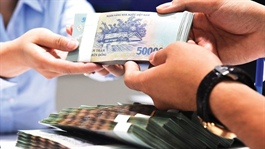Mastercard lending momentum to unfolding digital payments landscape
Mastercard lending momentum to unfolding digital payments landscape
Cashless payments are undoubtedly on an upward trajectory globally and regionally, highlighted by COVID-19 and governors expediting digital transformation. Safdar Khan, division president of Mastercard’s emerging markets in Southeast Asia department, shared with Celine Luu what key trends will shape the payment industry and how Mastercard creates a secure and convenient ecosystem to deliver seamless, top-notch contactless services to their customers.

Safdar Khan,division president of Mastercard’s emerging markets in Southeast Asia
|
The pandemic has been pushing digital transformation in Vietnam, which is also apparent in the growth of alternative payment means. Banks and fintech providers offer incentives to encourage cashless payment, while online grocery shopping and food delivery services jumped in demand. Retailers in Vietnam reported that orders by web and apps increased tenfold compared to before the pandemic. How do you think the habits of Vietnamese consumers changed compared to your expectations?
Even before COVID-19, digital habits and the adoption of e-commerce and cashless payments were on an upward trajectory in Vietnam. For instance, earlier this year, it was expected that over half of Vietnam’s population would transact digitally amidst the country’s surging e-commerce market. The pandemic only accelerated the rise of such preferences and adoption rates of digital habits.
Mastercard in partnership with The Fletcher School at Tufts University recently unveiled the Digital Intelligence Index, which charts the progress countries have made in advancing their digital economies, fostering trust and integrating connectivity into the lives of billions. This year’s index looks at two components: Digital Evolution and Digital Trust.
Vietnam’s Digital Momentum capabilities stand out in the Digital Intelligence Index (DII).
- Digital Evolution captures an economy’s historical momentum from the past to the present. Under this section, Vietnam stands tall among break out economies in the Asia Pacific. This implies that Vietnam is evolving rapidly with momentum and significant headroom for growth that is highly attractive to investors. Other countries in this category are China, India, Indonesia, Thailand, Cambodia, and Bangladesh.
- Digital Trust is the bridge that connects its journey from the digital present to an intelligent and inclusive digital future. Here, we find that economies such as China, Indonesia, and Vietnam have increasingly favourable attitudes towards their digital future, buoyed by rapidly expanding digital adoption.
This indicates that Vietnam was already primed for rapid digital adoption, all it needed was a catalyst which turned out to be COVID-19.
What key trends will be shaping the payments landscape of Vietnam in the upcoming time?
As consumers continue to adopt digital habits, the financial and payment landscapes will respond by becoming more digital-first and offering more accessible solutions for all. Some of the trends we see that will impact the payments sector are:
- A continuous decline in cash usage: In Vietnam, this year the total digital transaction value in Vietnam is projected to reach $8.606 trillion at an annual growth rate of 14.1 per cent. Moreover, the government has been quick to urge appropriate agencies and players to popularise mobile money to ensure people can make payments for small-value transactions. With a rapid increase in the number of people adopting cashless payments, we expect to see reduced usage of cash and higher dependency on online commerce for the long term.
- A further increase in e-commerce: According to Mastercard Economics Institute’s Economy 2021, ASEAN is the fourth largest e-commerce market in the world and is likely to stay strong as the middle-class recovers from the crisis in 2021. Our Impact Study has shown that within Southeast Asia, more than 40 per cent of surveyed consumers in Malaysia, the Philippines, Singapore, and Thailand reported they relied more on home delivery services in April than in March. Additionally, nearly half of the consumers surveyed in Malaysia, Singapore, and Thailand reported an increase in their online shopping during the same period. Online payments in Vietnam grew by 76 per cent between 25 January to mid-March 2020. With such preferences, we expect the e-commerce sector to continue its growth story in 2021.
- An increasing need for new authentication payments solutions: As more people embrace the digital lifestyle, greater emphasis and efforts will be needed to ensure that state-of-the-art technologies are in place to protect transactions across different digital touchpoints. New ways to authenticate payments, including the use of biometrics and other data that go beyond passwords and OTPs, will come to the forefront.
- An accelerated shift to digital: Our latest report Mastercard Economics Institute’s Economy 2021 has shown greater efforts by governments towards going digital.
- Governments are pushing for an increase of digital, contactless payments, to help reduce the spread of the virus. These efforts will continue to accelerate next year. Online business creation is rising and will continue to gain steam while other businesses will formalise by officially registering to take advantage of government programmes.
- Digitalisation has enabled financial inclusion in emerging markets. This has become more important as the World Bank estimates those in extreme poverty jumped by 71 million worldwide in 2020.
- Government support programmes using cashless and digital approaches may both help to counter the losses in incomes, as well as boost financial inclusion.
- In this regard, we expect greater support and innovations to take place to enable small- and medium-sized enterprises (SME) to join the digital economy.
- Increased expenditures for customers’ homes: Consumers are spending on retail and services, with a heavy focus on home appliances and similar goods. As travel spending was reallocated, home improvements and furniture expenditures were among the strongest components for the retail sector last year. Lower-income individuals continued to spend on essentials such as rent and groceries. These trends tell us where we could see some pent-up demand in 2021. Notably, elevated unemployment rates will provide a speed limit to the recovery in consumer spending.
What are Mastercard’s latest technologies to speed up cashless acceptance and adoption of cashless payments options? Do you have any unique technologies that other market players do not offer?
At Mastercard, we are committed to creating a world beyond cash, in which no one is left behind. This vision continues to drive us forward in what we do today – to use our technology and expertise to make payments safe, simple, seamless, accessible, and touch-free.
We have been actively working and collaborating with different partners across the world to create interoperable, secure, accessible, and convenient payment ecosystems where money can flow seamlessly. Whether it is transferring money or participating in global trade, we ensure that payment technologies work for all, anywhere, at any time.
COVID-19 has accelerated the need and demand for cashless payments. With Mastercard’s experience, we intend to leverage our insights, technologies, and knowledge in Vietnam to help create a cashless society and establish a robust digital payments ecosystem.
There are several notable solutions I would like to talk about that can enable Vietnam to accelerate its digital and cashless payment journey:
- For Consumers:
- Wearable payments: At this year’s Singapore Fintech Festival, we announced a partnership with MatchMove, a ‘Banking-as-a-Service’ fintech firm, and Tappy Technologies, a producer of wearable payment integrators. Under this partnership, we have been able to introduce tokenisation into small, flexible chips which can be attached to a range of battery-less wearables and accessories such as watch straps or keyrings, turning them into secure contactless payments devices.
- Biometric cards: Mastercard has teamed up with IDEMIA, a global leader in augmented identity, and MatchMove, on their first pilot in Asia for a biometric card that uses fingerprints to authorise transactions at in-store payment terminals. It makes transactions more convenient, safer, and more secure by eliminating the need for a cardholder to provide a PIN or signature, thereby reducing touch points in public places.
- Mastercard and facial recognition: Mastercard’s digital identity check identifies users by using unique personal characteristics such as fingerprints or the face. During checkout in a web store, the consumer will receive a pop-up on his mobile phone, through which he can authorise the payment easily via fingerprint scan or facial recognition.
- For SMEs:
- Buy now pay later: At the Singapore Fintech Festival 2020, together with Pine Labs, one of Asia’s leading merchant commerce platforms, we announced the launch of an integrated pay-later solution in five Southeast Asian markets early next year. This solution offers consumers the flexibility of zero-interest instalments on purchases to expand business for merchants and connected banks, fintech, payment gateways, and device makers. The solution will be rolled out in Thailand and the Philippines in February, followed shortly by Vietnam, Singapore, and Indonesia.
- SoftPos: Mastercard’s low-cost acceptance solution that allows SMEs to transform their regular smartphone into a point-of-sale terminal which can then accept contactless payments made with a physical card, and even digital wallets like Google Pay and Apple Pay.
- Simplifying commerce: This solution has been specifically designed to enable SMEs to grow and expand. The multifaceted solution covers a broad range of business needs, such as setting up their website, through to selling products and services via e-commerce channels.
- ZOHO: We have teamed up with cloud-based business solutions provider Zoho to provide SMEs access to digital tools like accounting software which help automate and digitalise time-sensitive, paper-based accounting processes, and hence reduce the amount of labour needed for administrative tasks. Additionally, Zoho also helps provide a more concrete digital picture of the business’s operations to help financial institutions make more informed decisions around extending credit.
- For cybersecurity
- RiskRecon: Mastercard acquired RiskRecon, a leading provider of artificial intelligence and data analytics solutions, to enhance cybersecurity capabilities and infrastructures. Through a powerful combination of AI and data-driven advanced technology, RiskRecon and Mastercard will be able to accelerate our existing suite of cyber solutions that can help financial institutions, merchants, and governments
- Identity check: is Mastercard’s brand name for EMV 3DS solutions. EMV 3DS enables merchants to share enhanced data as part of the authentication request to the issuer. The issuer then uses this data to perform risk-based authentication to approve authentications without OTPs. Alternatively, issuers can challenge the request with OTPs, biometrics, and others, if they deem these as high risks.
- Brighterion: This delivers a leading AI and machine learning platform that provides real-time mission-critical intelligence from any data source, regardless of type, complexity, and volume.




























